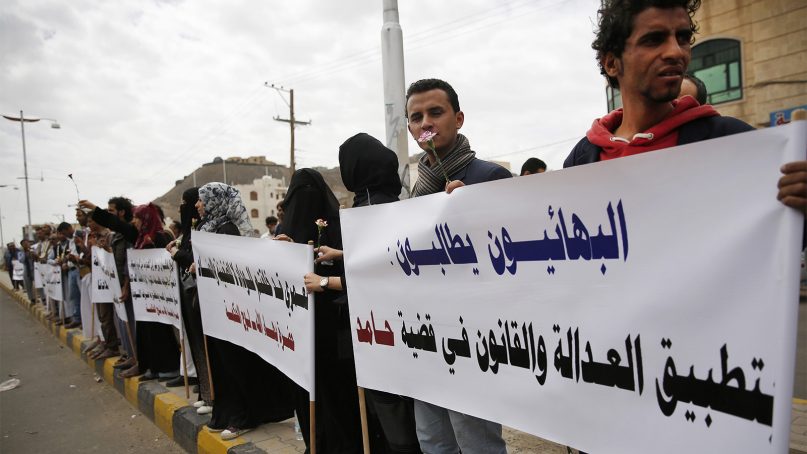(RNS) — In late July, my brother-in-law returned to his home in Tehran from running some errands to find the house upended, his belongings missing and his wife gone. His wife, my little sister, Fariba Kamalabadi, had simply disappeared. For hours we agonized over her disappearance until the family received a phone call. It was Fariba. Any relief we felt at having her located was instantly dissipated when she told us she was back in Evin Prison, Iran’s notorious jail for human rights activists and anyone else deemed threatening to the government.
My sister is a peaceful, humble and law-abiding person. This was her fourth arrest. The third resulted in a decade-long prison sentence from which she was released in 2017. In all instances, she has been innocent of any crime. She is, however, a Baha’i.
The Baha’i faith is the largest religious minority in Iran. Our religion preaches unity and peacefulness, and yet, since we believe in a prophet after Muhammad, the so-called Islamic Republic of Iran has persecuted us harshly.
My sister Fariba is one of many victims of this campaign, and indeed, her arrest on Sunday was part of a broader series of raids conducted against some 50 Baha’i households across the country. Astonishingly, the Iranian government issued a statement on these arrests through their Ministry of Intelligence, claiming the Baha’is were an “espionage political party,” proponents of “Baha’i colonialism” and “infiltrating educational environments.” These are tired canards and have been used against our community for decades. The idea of my sister being some sort of devious spy would be funny if it weren’t capable of causing so much harm.
If you follow news from Iran, you may have heard Fariba’s name. Roxana Saberi, the American journalist who was imprisoned arbitrarily in Iran, spent some time with Fariba and her friend Mahvash Sabet (who was also arrested again on Sunday). She recalled fondly how when fruit rations were distributed in the prison, Fariba would take the worst piece for herself so her fellow inmates would have some decent nourishment. In winter, when Roxana went on a hunger strike in their unheated cell to protest her conditions, Fariba and Mahvash literally gave her the clothes off their back to keep her warm. She called them the “angels of Iran.”
As her brother, these stories about Fariba did not surprise me. She was always different from the rest of us, conscientious to a degree that always seemed superhuman, if not angelic. During the decade of her imprisonment, she was always positive, joking with us on the rare occasions when we could speak with her. When she was sentenced, she decided with Mahvash that they would do everything they could to improve the lives of those they were incarcerated with.
I was worried about her during this time, as she was sometimes placed in cells with murderers and drug dealers, those whom the government considered the dregs of society. When I shared with her my concerns, her response astonished me. She told me she did not look at the outer reality or social standing of people, but rather their inner spirit. Each, she insisted, had a pure soul that God had placed in them. As a Baha’i, she felt it was her duty to see their humanity and bring out the best in them.
Apparently, to the Iranian government, such a person is so dangerous she must be locked up and harassed, over and over again. Iranian Baha’is are used to this story, as we’ve been watching it unfold over generations. Both Fariba and I remember seeing the face of our father for the first time when he was released from prison in 1986, having been severely tortured for his religious convictions. And I remember the joy our family felt in 2017 when Fariba was released. We dared to dream she might live unmolested for at least some time. But it seems she has again been called to pay the price for being true to her beliefs.
How dear that price may be remains to be seen. As the nuclear deal continues to unfold, I believe Iran is currently flexing its muscles of oppression, seeing what it can accomplish right under the nose of the international community. My sister, though a humble woman, is a high-profile prisoner. If Iran can do as it wishes with her, it bodes ill for the rest of the thousands-strong Baha’i community there and every other persecuted minority in the country.
Since hearing of Fariba’s arrest and imprisonment, I have barely slept. I’ve been calling everyone I know, trying to get further word on her whereabouts and well-being. For all I’ve said here, Fariba is not a symbol. She is my sister, and she is right back where she was five years ago, in Evin Prison, for no reason. It would be easy to feel frustrated. But when I search my heart, I have to smile. It seems that, as she does with everyone, she has brought out the best in me: I feel nothing but love and pride.
(Iraj Kamalabadi is a member of the Baha’i faith who lives in California. The views expressed in this commentary do not necessarily reflect those of Religion News Service.)






